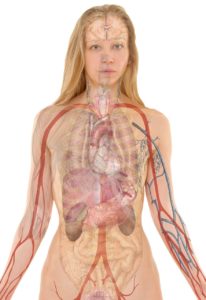Could Low Stomach Acid Be to Blame
For Your Mood Issues?
We don’t give stomach acid and digestion too much of a thought unless we are experiencing heartburn, acid reflux, gas, bloating and digestive pain. While these are concerns, did you know that stomach acid levels can also impact your mental health, yet your physical signs of low stomach acid may be mild to you or you just think “I’ll pop a tums”, not thinking that some gas, bloat and heartburn can be associated with your other health issues.
My son has GERD symptoms for years, only I didn’t even know it. When he was in fifth grade I vividly remember him saying to me “Mom, I can regurgitate my food just like a goat!” After asking him some questions, I found out, this had been occurring for him daily for years but he just thought it was normal. It wasn’t until years of chronic acid reflux did the mental health issues occur.
According to Johnathan Wright in “Why Stomach Acid is Good For You”, he estimates that as many as 90% of Americans are dealing with low stomach acid and many are unaware it is the root cause of some of their health issues. Many people assume if they have acid reflux, gas, indigestion and so forth that they have too much stomach acid but just the opposite may be true. If your doctor treats you for elevated stomach acid, it can compound your problem.
But even worse, when it comes to mental health issues, most doctors don’t even give stomach acid a thought when they should.
What is Stomach Acid
Your stomach is a highly acidic environment and you need adequate levels of stomach acid in order to break down proteins, kill pathogens and ionize minerals (ionizing minerals increases their bioavailability). Thus, without adequate levels of stomach acid, you cannot break down proteins into amino acids needed for brain health, you cannot kill pathogens that enter the body and thus can lead to infections, and you don’t have the needed minerals for ideal physical and mental health.
Common Signs and Symptoms of Low Stomach Acid
By this I mean, this is what most people think of when they think of stomach acid issues (although most people associate these below with too much stomach acid)
- Gas, bloating
- Food feeling like it is “just sitting there”
- Diarrhea
- Constipation
- Heartburn, GERD, acid reflux
- Food particles in your stool
Uncommon Signs and Symptoms of low Stomach Acid
These are the ones that you most likely don’t associate with stomach acid. It can be difficult to tie many health issues to low stomach acid because these health issues can take years and even decades to develop and therefore may seem like they have nothing to do with stomach acid.
It’s not like one day you develop low stomach acid and the next day you develop depression. It takes time for these health issues to slowly develop.
(They may have other causes, but low stomach acid should be ruled out.)
- Depression (see next section)
- Anxiety (see next section)
- Fatigue, low energy-stomach acid is needed to utilize B12 (an “energy “vitamin)
- Hair loss-not getting the amino acids needed for hair health
- Cracked, peeled fingernails-same as above
- Muscle wasting-if you can’t utilize your amino acids, your body will break down muscle to get the needed amino acids
- Food sensitivities-the undigested protein makes its way down to the small intestine where it should not be and causes inflammation (leaky gut syndrome). These undigested proteins now break through the leaky barriers in the intestinal wall and your body starts to attack these invaders causing an allergic response.
- Candida-it can overgrow when stomach acid is not present to keep it in check (you will always have some yeast in the body)
- Parasites, bacterial imbalance, SIBO-you need stomach acid to kill pathogens that enter the body. This is one reason why some people are more “sensitive” to bacteria found on food and become ill why someone else may not.
- Skin issues- skin issues are almost always related to gut issues. Low stomach acid can cause food sensitivities and these food sensitives can also be a cause of skin issues such as acne, rosacea, psoriasis and eczema.
- Bad breath– this is a result of too much negative bacteria in the intestinal track because stomach acid is not present to destroy these pathogens.
- RA (rheumatoid arthritis). There are many studies linking RA with low stomach acid.
- Osteoporosis: Because you cannot utilize minerals, such as calcium, and other minerals needed for bone health, it can lead to brittle bones.
- Low thyroid function-hypothyroidism effects gastrin production. Gastrin (a hormone), is needed to stimulate stomach acid production from the parietal cells (these cells are in the stomach lining).
- You are over 50 years of age. (as we age stomach acid levels decline). (When I used to work in long term care it was not uncommon for a large part of the resident population to be on proton pump inhibitors (PPI’s), contributing to nutrient deficiencies and host of other issues in the elderly) See below for more info on PPI”s.
- Blood Sugar Issues: For many people blood sugar issues are a result of their diet, but if you have low stomach acid you cannot utilize your protein and protein is needed to help balance blood sugar and keep cravings at bay.
- Anemic: Iron is another vital mineral that cannot be absorbed without adequate levels of stomach acid.
- Adrenal Issues: When you cannot utilize your proteins and minerals, this is stress on the body and impacts your cortisol levels and adrenal glands.
- Asthma: I only recently learned that asthma is an issue more so of the gut than of the lungs!
Amazing at how many health conditions can be traced back to low stomach acid!
How Does Low Stomach Acid Cause Mood Disorders?
Many of your neurotransmitters (NT’s) are made in the gut. You need amino acids from your food to create your NT’s. Decreased stomach acid means decreased amino acids since you need stomach acid to break down proteins into amino acids, which thus impacts the function of your NT’s which can lead to mood issues.
A study I read showed that those with psychiatric disorders report more heartburn than the control group. The reflux symptoms in the study were not associated with medication. Is it just a correlation or could the stomach issues be at the root of the psychiatric disorders?
The solution is first to determine if low stomach acid is an issue for you and address this, then address overall gut and microbiome health. While working on this, it may be useful to take a product that includes all the essential amino acids to help support your NT’s. Once gut health and stomach acid levels have been supported, one can discontinue taking the amino acids
The Problem with Acid Suppressors
There are two categories of acid suppressors. These are histamine (H2) Receptor blockers and Proton Pump Inhibitors.
The most obvious problem is that your doctor may prescribe this for you without checking to see if your stomach acid is high or low. If it is already low, you are further compounding your problems. Most people assume that they have high acid levels, but stomach acid declines with age.
For more information on H2 Receptor blockers such as Zantac and Pepcid, read this post
Proton Pump Inhibitors, another class of drugs used for GERD and heartburn, that will also lower stomach acid levels, come with a host of concerns such as nutrient depletion, greater heart attack risk, increase risk of kidney disease, increased risk of c-diff infection and pneumonia, increased risk of bone fractures and dementia.
In addition to this, most people are on these medications long term when they should only be used for several weeks to 3 months at most.
How to Determine if You Have Low Stomach Acid
- During a period of irritation-drink a small amount of pure lemon juice (1 tsp.)
- If the problem resolves, the lemon juice helped, low HCL (hydrochloric acid, aka stomach acid) is indicated
- If your condition worsens, drink ¼ tsp. of baking soda dissolved in water-if your condition improves after drinking this solution, high HCL is indicated.
- Another option-this can be done any time, not just during periods of irritation: drink 1 T. Acv mixed w/water-if you feel a burning sensation, it means your HCL is high, if you do not feel anything, you have good to low HCL. ACV will help when you have low HCL.
What May Be Causing Your Low Stomach Acid Levels
- Hiatal hernia
- Hormones (yours and in your food)
- Eating too much, too quickly, too late
- Relaxation of esophageal sphincter
- Low/high HCL
- High fat, fried foods-delays emptying of stomach
- Coffee, caffeine, carbonated beverages, spicy foods
- Regular use of antacids-causes low HCL, B12 deficiency, mineral deficiency, immune system compromised
What to Do If Your Stomach Acid Is Low
Addressing low stomach acid is different than addressing high stomach acid so it is important to know which one is an issue. Hopefully, with the simple home test above, you have figured out if low stomach acid is an issue for you or not.
- Add in bitters. This can be a bitter herbal tincture or add in dark bitter leafy greens into your diet daily. (not Swedish bitters-this is a stronger blend that is best used during times of constipation, not to be used daily. This blend I like to use when traveling and not eating and exercising the way I normally do)
- Digestive enzymes-some people may need digestive enzymes short term to help break down proteins until stomach acid levels return to a normal.
- Include magnesium and zinc rich foods into the diet. You may also need to supplement with both short term (many need to supplement with magnesium long term)
- Eat a fiber rich diet. This does not mean taking a fiber supplement but instead increasing the amount of whole foods in the diet. Consume a variety of fruit, veggies, leafy greens, beans and legumes
- Spicy herbs: while spicy herbs for someone with elevated stomach acid level can make them feel worse, for someone with low stomach acid, this should help you. Spicy herbs include ginger, turmeric, and red pepper.
- Add in carminative herbs-these herbs are soothing. These herbs include allspice, cloves, dill and basil. A Carminative tea blend can be helpful: Use ½ tsp of each herb: lemon balm, chamomile, thyme, ginger, (fennel if gas is an issue)
- Add in a probiotic (I like megaspore by Microbiome Labs)
- Slow down! Don’t inhale your food or eat while on the go. Chew each bite of food at least 15 times!
- Add in fermented foods such as kimchee, miso, and fermented vegetables
- Eat smaller meals-if you eat only large meals, say with huge protein portions such as an 8-ounce steak, you don’t have enough stomach acid to break all that protein down. Consume protein in smaller amounts throughout the day while working on returning stomach acid levels to the normal range.
- Follow a gut healing protocol to restore balance and health in the gut.
- Get tested for Food sensitivities and do a gut healing protocol once you know your trigger foods, if any. An endoscopy, esophageal pH monitoring, or a manometry may be used to diagnose acid reflux. Other times doctors will make a diagnosis and plan of treatment based on your symptoms. (from what I have seen in my clients, most get treated via their doctor based on symptoms alone and get treated for high stomach acid.)
- Drink after meals not with meals! Dont dilute your needed digestive enzymes.
Bottom Line
Low stomach acid can be a contributing factor in mental health issues and other health issues that you and your doctor may not associate with gut health. The at home test is good to try if you do experience physical, gut signs and symptoms of stomach acid issues. If you are not sure if stomach acid is a contributing factor, you can still follow the suggestions above to see if they help. Some times it is better to add in only one to three of the suggestions above so that you know what is and isn’t helping you. It is best to follow these guidelines with the help of your health professional. You should seek professional help, especially if you are on any medications.
Sources
Bauman, E. & Friedlander, J. (2014) Therapeutic Nutrition. CA: Bauman College
Wright, J. & Lenard, L. (2001) Why Stomach Acid is good for you. NY: M. Evans
https://nutritionreview.org/2018/11/gastric-balance-heartburn-caused-excess-acid/
https://onlinelibrary.wiley.com/doi/full/10.1046/j.1365-2036.2001.01131.x
https://www.clinicaleducation.org/resources/reviews/the-role-of-hcl-in-gastric-function-and-health/
https://www.uspharmacist.com/article/proton-pump-inhibitors-considerations-with-longterm-use








Leave A Comment
You must be logged in to post a comment.